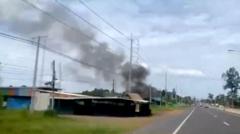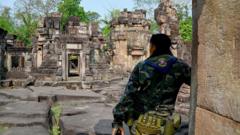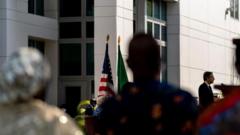The recent violent exchanges between Thai and Cambodian troops at the border have reignited longstanding tensions rooted in politics and betrayal.
Fractured Ties: Unpacking the Escalating Tensions at the Thailand-Cambodia Border

Fractured Ties: Unpacking the Escalating Tensions at the Thailand-Cambodia Border
Recent border clashes prompt questions about deteriorating relations and historical enmities.
In a shocking escalation, the border skirmish between Thailand and Cambodia on July 24 has left 12 reported dead, stirring lingering animosities and revealing critical schisms between the nations. Historically, the two Southeast Asian neighbors have navigated a complex and often violent relationship over their shared, disputed frontier. Prior clashes in 2008 and 2011 that resulted in significant casualties were managed relatively quickly through diplomatic channels. However, recent events following the injury of five Thai soldiers in a landmine explosion have exacerbated hostilities, leading to a bloody confrontation.
The backdrop of this turmoil is the strained political relationship between Cambodian Prime Minister Hun Sen and Thailand’s suspended Prime Minister Paetongtarn Shinawatra, sparked by the leak of a private phone conversation that left Thai officials flabbergasted. In this conversation, Paetongtarn, who referred to Hun Sen as "uncle," expressed criticism towards her military leadership, leading to a public uproar in Thailand and her subsequent suspension.
That incident has marked a significant decline in rapport between the Shinawatra and Hun Sen families, which had previously been characterized by a cooperative alliance, even amid accusations of political espionage and asylum seeking. The exposure of intimate discussions has provoked both sides to engage in slandering and investigative probes into cross-border corruption and organized crime, further inflaming tensions.
Rather than seeking de-escalation, both nations have ramped up military presence and hostile rhetoric. Hun Sen has claimed possession of damaging documents about Thaksin Shinawatra, possibly aimed at garnering domestic support and consolidating his political power amid economic hardships. Meanwhile, Thailand’s government faces economic challenges that complicate their response stance. With each government feeling the pressure from their respective electoral bases, the likelihood of meaningful diplomatic engagements appears slim.
As the situation remains fragile, the role of ASEAN in mediating these disputes is critical, as their historical mission aims to prevent conflict between members. However, effective intervention is complicated by the current domestic political landscapes, where neither Cambodian nor Thai leaders appear willing to back down.
In summary, the ongoing tensions at the Thailand-Cambodia border highlight the intricate interplay of past friendships, betrayal, and national interests. As both countries grapple with their internal challenges, the potential for resolving these conflicts hinges on the willingness of their leaders to put aside grievances for the sake of stability and peace.
The backdrop of this turmoil is the strained political relationship between Cambodian Prime Minister Hun Sen and Thailand’s suspended Prime Minister Paetongtarn Shinawatra, sparked by the leak of a private phone conversation that left Thai officials flabbergasted. In this conversation, Paetongtarn, who referred to Hun Sen as "uncle," expressed criticism towards her military leadership, leading to a public uproar in Thailand and her subsequent suspension.
That incident has marked a significant decline in rapport between the Shinawatra and Hun Sen families, which had previously been characterized by a cooperative alliance, even amid accusations of political espionage and asylum seeking. The exposure of intimate discussions has provoked both sides to engage in slandering and investigative probes into cross-border corruption and organized crime, further inflaming tensions.
Rather than seeking de-escalation, both nations have ramped up military presence and hostile rhetoric. Hun Sen has claimed possession of damaging documents about Thaksin Shinawatra, possibly aimed at garnering domestic support and consolidating his political power amid economic hardships. Meanwhile, Thailand’s government faces economic challenges that complicate their response stance. With each government feeling the pressure from their respective electoral bases, the likelihood of meaningful diplomatic engagements appears slim.
As the situation remains fragile, the role of ASEAN in mediating these disputes is critical, as their historical mission aims to prevent conflict between members. However, effective intervention is complicated by the current domestic political landscapes, where neither Cambodian nor Thai leaders appear willing to back down.
In summary, the ongoing tensions at the Thailand-Cambodia border highlight the intricate interplay of past friendships, betrayal, and national interests. As both countries grapple with their internal challenges, the potential for resolving these conflicts hinges on the willingness of their leaders to put aside grievances for the sake of stability and peace.



















